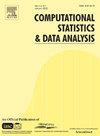Component selection and variable selection for mixture regression models
IF 1.6
3区 数学
Q3 COMPUTER SCIENCE, INTERDISCIPLINARY APPLICATIONS
引用次数: 0
Abstract
Finite mixture regression models are commonly used to account for heterogeneity in populations and situations where the assumptions required for standard regression models may not hold. To expand the range of applicable distributions for components beyond the Gaussian distribution, other distributions, such as the exponential power distribution, the skew-normal distribution, and so on, are explored. To enable simultaneous model estimation, order selection, and variable selection, a penalized likelihood estimation approach that imposes penalties on both the mixing proportions and regression coefficients, which we call the double-penalized likelihood method is proposed in this paper. Four double-penalized likelihood functions and their performance are studied. The consistency of estimators, order selection, and variable selection are investigated. A modified expectation–maximization algorithm is proposed to implement the double-penalized likelihood method. Numerical simulations demonstrate the effectiveness of our proposed method and algorithm. Finally, the results of real data analysis are presented to illustrate the application of our approach. Overall, our study contributes to the development of mixture regression models and provides a useful tool for model and variable selection.
混合回归模型的成分选择和变量选择
有限混合回归模型通常用于解释群体中的异质性以及标准回归模型所需的假设可能不成立的情况。为了扩大高斯分布以外的分量分布的适用范围,探索了其他分布,如指数功率分布、偏正态分布等。为了同时实现模型估计、顺序选择和变量选择,本文提出了一种惩罚似然估计方法,该方法对混合比例和回归系数都施加惩罚,我们称之为双惩罚似然方法。研究了四种双重惩罚似然函数及其性能。研究了估计量的一致性、阶数选择和变量选择。提出了一种改进的期望最大化算法来实现双重惩罚似然方法。数值仿真验证了所提方法和算法的有效性。最后,给出了实际数据分析的结果来说明我们的方法的应用。总的来说,我们的研究有助于混合回归模型的发展,并为模型和变量的选择提供了有用的工具。
本文章由计算机程序翻译,如有差异,请以英文原文为准。
求助全文
约1分钟内获得全文
求助全文
来源期刊

Computational Statistics & Data Analysis
数学-计算机:跨学科应用
CiteScore
3.70
自引率
5.60%
发文量
167
审稿时长
60 days
期刊介绍:
Computational Statistics and Data Analysis (CSDA), an Official Publication of the network Computational and Methodological Statistics (CMStatistics) and of the International Association for Statistical Computing (IASC), is an international journal dedicated to the dissemination of methodological research and applications in the areas of computational statistics and data analysis. The journal consists of four refereed sections which are divided into the following subject areas:
I) Computational Statistics - Manuscripts dealing with: 1) the explicit impact of computers on statistical methodology (e.g., Bayesian computing, bioinformatics,computer graphics, computer intensive inferential methods, data exploration, data mining, expert systems, heuristics, knowledge based systems, machine learning, neural networks, numerical and optimization methods, parallel computing, statistical databases, statistical systems), and 2) the development, evaluation and validation of statistical software and algorithms. Software and algorithms can be submitted with manuscripts and will be stored together with the online article.
II) Statistical Methodology for Data Analysis - Manuscripts dealing with novel and original data analytical strategies and methodologies applied in biostatistics (design and analytic methods for clinical trials, epidemiological studies, statistical genetics, or genetic/environmental interactions), chemometrics, classification, data exploration, density estimation, design of experiments, environmetrics, education, image analysis, marketing, model free data exploration, pattern recognition, psychometrics, statistical physics, image processing, robust procedures.
[...]
III) Special Applications - [...]
IV) Annals of Statistical Data Science [...]
 求助内容:
求助内容: 应助结果提醒方式:
应助结果提醒方式:


